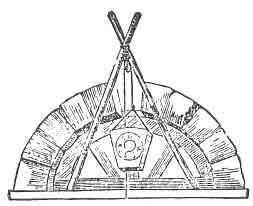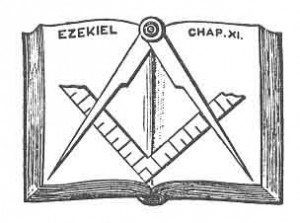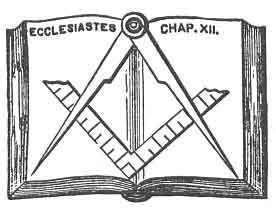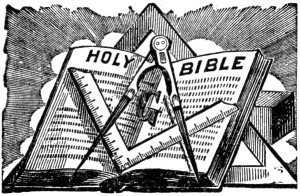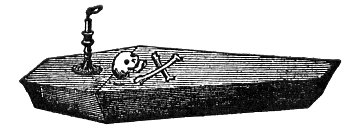p. 106
MASONRY is a succession of allegories, the mere vehicles of great lessons in morality and philosophy. You will more fully appreciate its spirit, its object, its purposes, as you advance in the different Degrees, which you will find to constitute a great, complete, and harmonious system.
If you have been disappointed in the first three Degrees, as you have received them, and if it has seemed to you that the performance has not come up to the promise, that the lessons of morality are not new, and the scientific instruction is but rudimentary, and the symbols are imperfectly explained, remember that the ceremonies and lessons of those Degrees have been for ages more and more accommodating themselves, by curtailment and sinking into commonplace, to the often limited memory and capacity of the Master and Instructor, and to the intellect and needs of the Pupil and Initiate; that they have come to us from an age when symbols were used, not to reveal but to conceal; when the commonest learning was confined to a select few, and the simplest principles of morality seemed newly discovered truths; and that these antique and simple Degrees now stand like the broken columns of a roofless Druidic temple, in their rude and mutilated greatness; in many parts, also, corrupted by time, and disfigured by modern additions and absurd interpretations. They are but the entrance to the great Masonic Temple, the triple columns of the portico.
You have taken the first step over its threshold, the first step toward the inner sanctuary and heart of the temple. You are in the path that leads up the slope of the mountain of Truth; and
p. 107
it depends upon your secrecy, obedience, and fidelity, whether you will advance or remain stationary.
Imagine not that you will become indeed a Mason by learning what is commonly called the “work,” or even by becoming familiar with our traditions. Masonry has a history, a literature, a philosophy. Its allegories and traditions will teach you much; but much is to be sought elsewhere. The streams of learning that now flow full and broad must be followed to their heads in the springs that well up in the remote past, and you will there find the origin and meaning of Masonry.
A few rudimentary lessons in architecture, a few universally admitted maxims of morality, a few unimportant traditions, whose real meaning is unknown or misunderstood, will no longer satisfy the earnest inquirer after Masonic truth. Let whoso is content with these, seek to climb no higher. He who desires to understand the harmonious and beautiful proportions of Freemasonry must read, study, reflect, digest, and discriminate. The true Mason is an ardent seeker after knowledge; and he knows that both books and the antique symbols of Masonry are vessels which come down to us full-freighted with the intellectual riches of the Past; and that in the lading of these argosies is much that sheds light on the history of Masonry, and proves its claim to be acknowledged the benefactor of mankind, born in the very cradle of the race.
Knowledge is the most genuine and real of human treasures; for it is Light, as Ignorance is Darkness. It is the development of the human soul, and its acquisition the growth of the soul, which at the birth of man knows nothing, and therefore, in one sense, may be said to be nothing. It is the seed, which has in it the power to grow, to acquire, and by acquiring to be developed, as the seed is developed into the shoot, the plant, the tree. “We need not pause at the common argument that by learning man excelleth man, in that wherein man excelleth beasts; that by learning man ascendeth to the heavens and their motions, where in body he cannot come, and the like. Let us rather regard the dignity and excellency of knowledge and learning in that whereunto man’s nature doth most aspire, which is immortality or continuance. For to this tendeth generation, and raising of Houses and Families; to this buildings, foundations, and monuments; to this tendeth the desire of memory, fame, and celebration, and in effect the strength of all other human desires.” That our influences shall

Moe is the founder of GnosticWarrior.com. He is a father, husband, author, martial arts black belt, and an expert in Gnosticism, the occult, and esotericism.


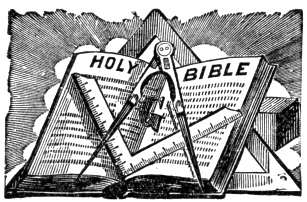
![How the Abbot Ceolfrid sent master-builders to the King of the Picts to build a church, and with them an epistle concerning the catholic Easter and the Tonsure [710 A.D.] | Book 5 | Chapter 20 How the Abbot Ceolfrid sent master-builders to the King of the Picts to build a church, and with them an epistle concerning the catholic Easter and the Tonsure [710 A.D.] | Book 5 | Chapter 20](https://www.gnosticwarrior.com/wp-content/plugins/contextual-related-posts/default.png)
